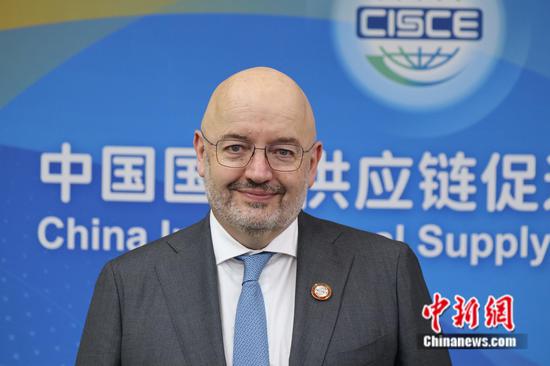
Home
Index
Insights | China's second supply chain expo boosts green development: WBCSD President
(ECNS) -- “I have high hopes of seeing this expo contribute to green development,” Peter Bakker, president and CEO of the World Business Council for Sustainable Development (WBCSD), shared his insights with China News Network at the ongoing 2nd China International Supply Chain Expo (CISCE) in Beijing on Tuesday.
At this year's expo, Bakker's focus was primarily on the development of new green technologies. He stated, “China is leading in many ways. So, whether it's clean energy, mobility, battery technologies, or hydrogen technologies; those are essential to decarbonize our economies and industrial processes. And if China can lead that, then it will remain the center of global industrial supply chains.”
Bakker referred to his recent speech at the 29th Conference of the Parties to the UN Climate Change Conference in Baku, Azerbaijan: "For seven consecutive years, China has invested more money in renewable, clean energies than any other country in the world."
He further emphasized, “The installed base of clean energy in China is growing rapidly that will allow the decarbonization of steel, aluminum, and other heavy emitting industries. And that will then make sure that green steel is available in supply chains around the world. So it's not just China's investments in China, but it will really help green the supply chains all around.”

Regarding global supply chain sustainability, Bakker said it is necessary to establish a carbon accounting system that is universally applied. “I know the Ministry of Ecology and Environment in China is currently working on the Chinese carbon accounting rules,” he said, adding that it’s necessary to ensure that the global carbon accounting system is aligned. “This way, when a product made in China is shipped into a supply chain, we know the carbon content all across that supply chain and we have that so that the data is comparable. I think the Chinese innovation will really drive decarbonization across the world.”
Bakker also emphasized the importance of the circular economy. saying that “If we have to decarbonize our industries, then about 40 to 45 percent of that decarbonization has to come from a circular economy.”
He pointed out that material reuse within supply chains is critical: “We need to reuse materials in all parts of our supply chains. I think that's a massive opportunity for supply chains. New solutions need to be built in. We need to collect the used materials. We don't need to recycle those or reprogram them, and then put them back into the original products. But I think that's a massive new job opportunity, but also a massive new supply chain management opportunity.”



